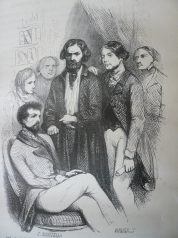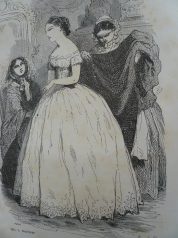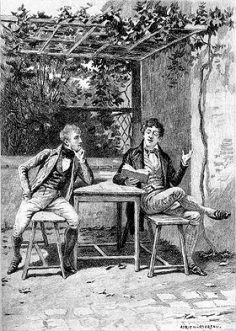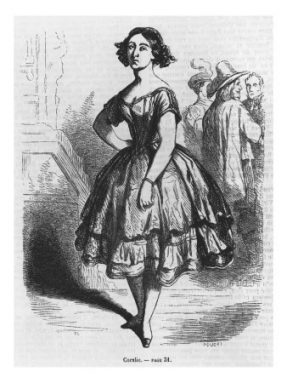
Lost Illusions (Episode 2)
THE HUMAN COMEDY – Honoré de Balzac Eighth volume of works of Honoré de Balzac edited by widow André Houssiaux, publisher, Hebert and Co, successors, 7 rue Perronet – Paris (1877) Scenes from provincial life

Lucien de Rubempré

Diane de Maufrigneuse
LOST ILLUSIONS Episode II A great man from the provinces in Paris Analysis of the work
A great man from the provinces in Paris Lost Illusions is one of Balzac’s most famous novels. In three separately published episodes, this is the story of a young man from Angoulême who believed himself to be a poet, who was praised in his province, who goes to Paris to seek fortune and fame, who fails and returns to his province after this failure. His beginnings are recounted in a kind of avant-scène, set in Angoulême, which was originally titledIllusions perdues (Lost Illusions). The second part ofIllusions perdues, entitled Un grand homme de province à Paris at the time of its publication, is the sequel to this first novel. A third novel, Les souffrances de l’inventeur, published four years later, is the conclusion of this trilogy, which Balzac finally presented under the general titleIllusions perdues. Lucien de Rubempré, the young man whose career we recount, brilliant but weak, seductive but inconstant, is the image of those incomplete organizations that have all the glamour of talent without the willpower, and the certainty by which we are superior to the events and hazards of life. Despite his faults at the dawn of his career, we can’t help feeling a little pity and indulgence for Lucien. His place in Balzac’s work is made all the more important by the fact that, in another of his greatest novels, Splendeurs et misères des courtisanes, the novelist sets him up for a revenge that ends in disaster. The interest in this character is not the only reason for the importance ofLost Illusions. The novel’s central episode, Un grand homme de province à Paris, is a damning deposition on the small newspapers of the years 1822 to 1824. Balzac was accused of seeking recognition for the most remarkable of them all, Le Figaro, which didn’t appear until a few years later, but whose editors expressed great indignation. This incident in the literary news would be negligible if it hadn’t had serious consequences for Balzac’s career. The Figaro contributors of 1828 had become powerful figures by 1837. They held critical and newspaper positions. Jules Janin, the most respected critic of the time, wrote a major article in the Revue de Paris in defense of this young team, of which he had been a member. “They wrote like the bird sings… They knew nothing of politics, nothing of the world… They didn’t do a single one of those insignificant cowardly things you say,” he replied to Balzac, and summing up their story, he concluded: “There isn’t a story purer, truer, more full of selflessness and self-denial.” All journalists, except Granier de Cassagnac, echoed Jules Janin. Le Charivari joined in the protest. The critic of L’Artiste , more severe, wrote: “To say everything in this novel that is false, exaggerated, implausible, commonplace, even trivial, would be too difficult, and we give it up.” Albéric Second, even more categorical, declares: “M. de Balzac is dead”, and adds: “This part of his book is so hideous that we won’t do him the honor of dealing with it any further”. The critic of La Revue des Deux Mondes, de Lagenevais, called it “M. de Balzac’s latest and most repugnant work”. From then on, a state of war was declared between Balzac and journalists that lasted several years, during which the latter systematically directed their attention to his novels, and tried to present him as an unimportant writer whose works could be placed alongside those of Paul de Kock, Pigault-Lebrun and Frédéric Soulié on shelves reserved for second-rate literature. This illustration, which was at the root of some of the press’s ostracism of Balzac during the second half of his life, later became one of the reasons for historians’ and critics’ interest in his work. Lost illusions. Whether or not Balzac sought to attack Le Figaroit was certain, in any case, that this second part ofLost illusions was, on the one hand, a first-rate document on the small political and literary press of the Restoration; and on the other, an invaluable testimony to years in Balzac’s career that were little-known. For it was obvious that we were dealing with “things seen”, as we knew from those years of Balzac’s life. At the same time, however, it was both difficult and important to know what we could learn from this testimony as a contribution to Balzac’s biography, and also what we could conclude from it in order to pass judgment on the press of those Restoration years. This brilliant exercise in the science and sagacity of commentary began almost as soon as academic study of Balzac’s work began. The first of these surveys was published in 1915 in the Revue de Paris by a young professor, Joachim Merlant, who was the leading academic specialist on Balzac at the time. Then, between the wars and after the Second World War, almost all Balzacians contributed to this fine-tuning. From the multitude of these investigations, let’s remember Suzanne Jean Bérard’s two-volume thesis, published in 1961, for its importance, and, for its date, the final 108-page preface to this novel by Roland Chollet, an excellent explorer of the journalistic maquis of the period. These indications show just how carefully, patiently and abundantly the specialists have researched the documents relating to this trial. Of course, there’s no question of summarizing these copious and learned monographs in just a few pages. They all note, moreover, that Lucien de Rubempré’s beginnings in the small press and bookshop of this period hark back to Balzac’s own journalistic beginnings in the wake of his first mentor, Auguste Le Poitevin de l’Egreville ; that Rubempré’s literary plans and the ambitious works he evoked were indeed Balzac’s own plans when he hoped to illustrate the history of France through a series of novels, as Water Scott had done for the history of England; that the ideas on the novel expressed in Lost illusions were Balzac’s ideas at the time; that Lucien de Rubempré’s bitter experiences with publishers of popular novels and bookshop discounters correspond to some of Balzac’s disappointments when he signed his novels Horace de Saint-Aubin ; that the small group of writers and thinkers in the Cénacle correspond to a series of parallel preoccupations from Balzac’s youth, about which our information is still incomplete; that Balzac wanted to portray himself in the guise of the earnest, conscientious, persevering writer he calls Daniel d’Arthez, who relies solely on hard work and willpower to produce the work that will give him rank and reputation ; that Balzac drew inspiration for some of Rubempré’s features from his protégé Jules Sandeau, whom he had taken in after his break with George Sand; that he used Gustave Planche’s character and features for his portrait of the critic Claude Vignon; that the other characters we encounter are all composite portraits for which we can only point out a few partial similarities; that, finally, we have no reference points in Balzac’s life that would allow us to implicate him in the “rackett” of the newspapers at the expense of the actors, nor in the trafficking of tickets, nor in the joyous corruption that he represents as the daily life of these small newspapers, to which his personal situation made him a stranger; that, nonetheless, certain details he gives, and which are confirmed by other witnesses, attest to a knowledge of theatrical life and backstage that we have, for these years of Balzac’s life, no way of shedding light on. This far too succinct summary of so much scholarly research leaves a question that is subsidiary for historians of Balzac, but not unrelated to the judgment that can be passed on the novel itself, virtually unanswered: were these editors of the small press the scoundrels that Balzac portrayed, or were they merely exuberant, eccentric, ironic young men, as Jules Janin, in response to Balzac, portrayed them? This verification is impossible. Balzac’s deposition may never receive any response other than the protest of Jules Janin and his friends. However, the few specimens of these small diaries that have come down to us give more credence to Jules Janin’s explanation than to Balzac’s indictment. The money doesn’t seem to be flowing into the coffers, the mischief is funny rather than ferocious, these budding gangsters don’t spread terror. It’s hard to form an opinion on the reality of the shameful practices against which Balzac claims to mobilize our indignation. All the more reason to find Balzac’s bold amplification of the reprobation he attaches to the sector of the press he describes, when he claims that most journalists – or, at any rate, a good proportion of them – are to blame. For in this description of an unknown country about which he claims to be making revelations, Balzac mixes things that are very different in essence and importance. Small satirical newspapers are part of the landscape, and they can indeed be a school for demoralization. But the means of success in theater and literature are another matter. We’re given a behind-the-scenes tour. Behind the scenes We don’t have a single map to guide us through the Bondy forest. Balzac, so precise in the same novel about the manufacture of paper, gives us no overview of the book trade, no classification, no figures: we suddenly go from Père Doguereau, who prints his novels in 1500 copies, to Dauriat, who prints 10,000 copies of major historical collections. It’s not the same business. Nor are the means the same. We don’t know what sells and what doesn’t, or what the usual or exceptional print runs are: and we doubt very much whether the little tricks of Lousteau and his cronies can make or break a book. It’s the same for theater. It’s a school of depravity for Rubempré. But under very special conditions. It’s probably impossible for us to make a history of 19th-century criticism other than by distinguishing trends: but it would be very surprising if surveys turned up many Rubempré or Lousteau who could decide on success or failure. At best, they’re just executors. Mediocrity and pettiness in criticism, as far as we can tell, often has a much simpler cause. There are few critics by vocation, and many who only became critics because they failed as writers or playwrights. This bitterness of envy is more than enough to animate their wickedness. First of all, the optics are falsified for the benefit of the drama. Balzac was well aware of this difficulty when he invented another panel of literary life, the incorruptibles of the Cenacle, to show in this novel about literature characters who are writers and not doers. These incorruptibles are not much truer than the journalistic adventurers they oppose: they are the two extremes of the profession. This opposition makes for some fine scenes, but they are a little too heroic. d’Arthez’s moral perfection has little to do with talent or success. D’Arthez is estimable, even admirable, if you like: he rehabilitates the writer. But Balzac dodged the drama of d’Arthez. There is no d’Arthez drama in Lost Illusions or in any of Balzac’s other works. D’Arthez becomes the great writer of La Comédie Humaine – we don’t know how, we don’t know why. And there is no d’Arthez drama because Balzac, who admirably understood all the harm that journalists and newspapers could do, failed to see the more distant prospects that would give d’Arthez and his friends a role that the development of information would one day make necessary, and thus legitimize the respect we demand for them. Balzac’s severe, premonitory pages in this part ofIllusions perdues go far beyond the picturesque description of a certain canton of the press that was the setting for his novel. But at the same time, these pages contain contradictions that Balzac hadn’t seen, and imply consequences he hadn’t guessed at. Indeed, his indictment of press freedom develops with admirable prescience the fatalities that threaten the great press in a regime of discussion. Claude Vignon, the honest man in the novel, sums them up very well. “The newspaper, instead of being a priesthood, has become a means for the parties; from a means it has become a business; and like all businesses, it is without faith or law. Every newspaper is a store where words are sold to the public in any color they want. Such a newspaper, reflecting the point of view of a certain party on every subject, is necessarily exposed to the manipulation of facts and the sophisms of reasoning. “Thus all newspapers will, in a given time, be cowardly, hypocritical, infamous, liars, assassins; they will kill ideas, systems, men and flourish by that very fact.” Their fundamental law will be to never be wrong. “Nothing he dislikes will be patriotic, and the newspaper will never be wrong. The result will be not only a degradation of consciences, a distortion of the facts, but, what is even more serious, real crimes that will always go unpunished because “evil will be done without anyone being guilty. I’ll be me Vignon, you’ll be you Lousteau, you Blondet, you Finot, Aristides, Plato, Cato, Plutarch’s men: we’ll all be innocent, we’ll be able to wash our hands of any infamy. Napoleon vindicated this moral or immoral phenomenon, as you will, in a sublime phrase dictated by his studies of the Convention: ” Collective crimes commit no one. ” It’s an admirable description of the dangers of professional journalism in a regime of political combat. And Balzac clearly saw the degradation of the journalist himself in the system of party struggles. The journalist has no friends: his friends are his party’s allies: “You believe in friends. We are all friends or enemies, depending on the circumstances. The journalist according to this definition doesn’t even have firm convictions: he has the convictions and reasoning that party tactics impose on him. Lousteau says bluntly: “A journalist is an acrobat. And he illustrates this maxim by improvising in front of Rubempré the two opposing articles that can be written about the same book. In the political press, the journalist is merely an instrument. He has to accept the weapons given to him as weapons, he has a job. “Insult and personality will become one of his public rights, adopted for the benefit of subscribers and passed into the form of res judicata by reciprocal usage.” In this man-to-man, party-to-party struggle, “you have to fight systematically not to be abandoned by your own kind”. And Lousteau himself ends up being moving in his confession when he admits: “These ignoble procedures disenchant the soul, deprave the heart and tire you to no purpose: for your efforts often serve to crown a man whom you hate to present in spite of yourself as a genius.” And Lousteau lifts his humiliated head in despair: “And I was good! I was pure of heart! And I have in my papers a poem that will die!” But such is the fate of party journalism. This kind of “press boxing” turns every servant of the big press into a subaltern, in other words, the opposite of a writer. A certain light cavalry of the press isn’t all the press, and Balzac shouldn’t be asked to account for anything beyond his subject. What he wants to describe, and describes admirably, is the story of a temptation. Rubempré is weak. But is he any more than Père Goriot ‘s Rastignac? Rastignac has no manuscript to place, no career to make, only recognition. And all is won for him when his cousin, Mme de Bauséant, recognizes him. All that’s left is to pay for his boots and hats. But Lucien’s name is Lucien Chardon, and for him the difficulty is twofold: he has to find dinner every day, place his manuscripts, and make a name for himself. That’s hard enough, but it’s only the first step, as his ultimate goal is to be recognized as Lucien de Rubempré. He won the first round, and in such difficult conditions that we pitied him as much as we despised him. Of course, he’s no conscience, and in fact he’s a madman, a good part of his misfortunes coming from that frenzy of vanity and pride that makes him spend in a few days on his toilet, his crew, his two-year pension. He wins this first round, but in a kind of fairy tale where everything is unreal. The novel is so well put together that you don’t even notice the implausibility. To feel it, we need to project onto Lost Illusions what we know of Balzac’s early work. Lucien’s elegant, miraculous rise in the newspapers and the literary world is as unreal as the puritanical majesty of the little gentlemen of the Cenacle. None of this is true. In this novel, we walk among magicians whose wands dispense triumph or despair. This is an arbitrary simplification. Rubempré’s loss, on the other hand, is engineered with such art, such perfidy, that we can’t help but feel for him the sympathy we feel for all the victims upon whom fate and mankind are unleashed.
The Story When they arrived in Paris, the two lovers, Lucien and Louise (Mme de Bargeton), found refuge in one of those despicable rooms that are the shame of Paris, but where there isn’t yet a single hotel where any wealthy traveler can’t find a home. Lucien had spent a year of his pension on the trip, and his Louise seemed much less beautiful in this cold, sunless room, with its faded furniture and decor. Ashamed of her protégé’s worldly manners and provincial bearing, she adopted a cold, distant attitude towards Lucien from the very first days of their arrival in Paris. To top it all off, she feels ridiculed by her lover’s inexperience and missteps at the opera, which he will be mocked for. She abandoned him completely for the Marquise d’Espard and the pleasures of Parisian life. Betrayed by Louise, Lucien can only rely on his hard work, and sets about improving his two manuscripts: his sonnet of poems “Les Marguerites” and his historical novel “L’Archer de Charles IX”. He met the friends of the Cénacle, of which he became a member, and became particularly close to the writer Daniel d’Arthez. Not finding the success he had hoped for with his works, he left the Cénacle to go into journalism, where, with the help of Lousteau (journalist and editor), he achieved real success. A frequent visitor to theaters to write reviews of comedies, dramas and vaudevilles, he comes to the attention of the beautiful actress Coralie, who falls madly in love with him. He will also fall madly in love with her. Lucien became the darling of the press, a talented columnist and an astute critic, and from then on he led the lavish, glittering life of the wealthy. Without realizing it, he will make enemies of people who are jealous of him, as well as those who are hurt by his newspaper. He suffers the vengeance of Louise de Négrepelisse (Mme de Bargeton), hurt more by Lucien’s indifference to him than by the acid articles written by him in his effigy, afflicting him with the nickname “grande seiche” (“big cuttlefish”). His boundless pride and vanity will lead him into reckless spending and debt. Ruined, he will ruin his mistress, who will die. He dragged down his mother, brother-in-law and sister, whom he also robbed. He returned to Angoulême in total destitution.
Sources analysis/history: Preface, as per Volume XI, compiled from the complete text of the Comédie Humaine published by France Loisirs 1985 under the auspices of the Société des Amis d’Honoré de Balzac.

Lucien de Rubempré and his friend de Marsay

Coralie
You’ll find the main characters in this story in the character analysis in Episode 1.
No Comments